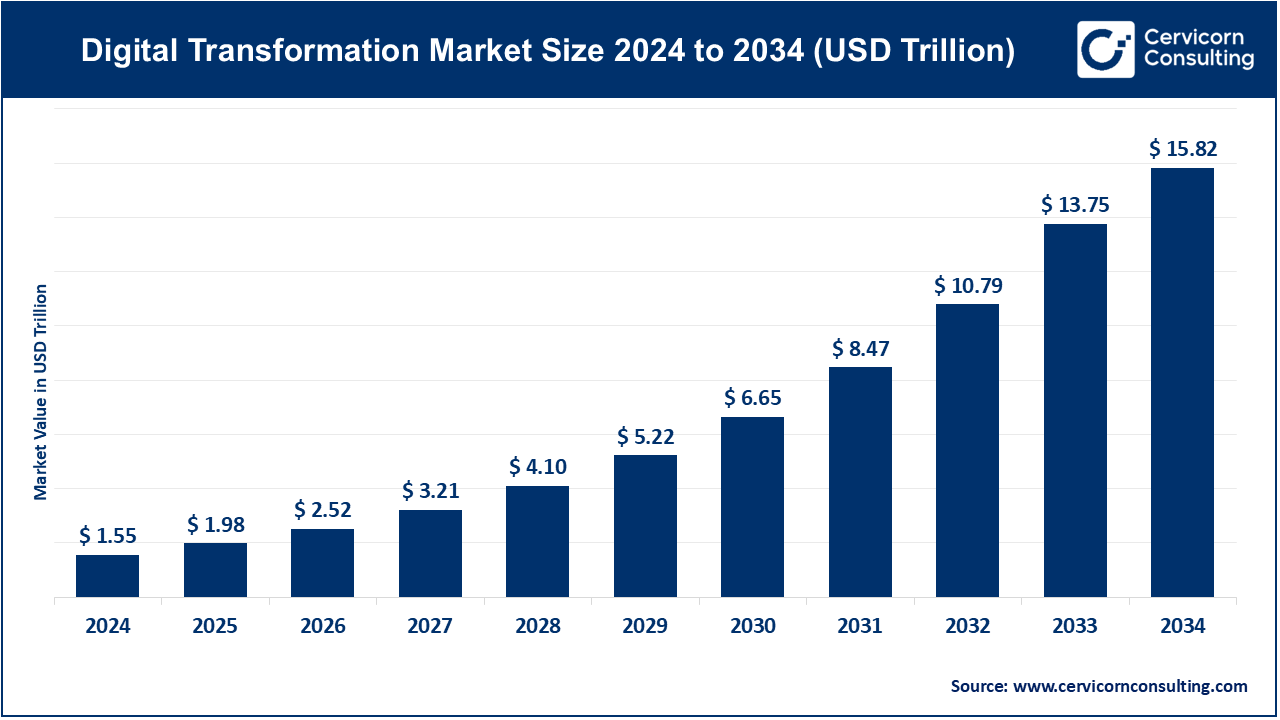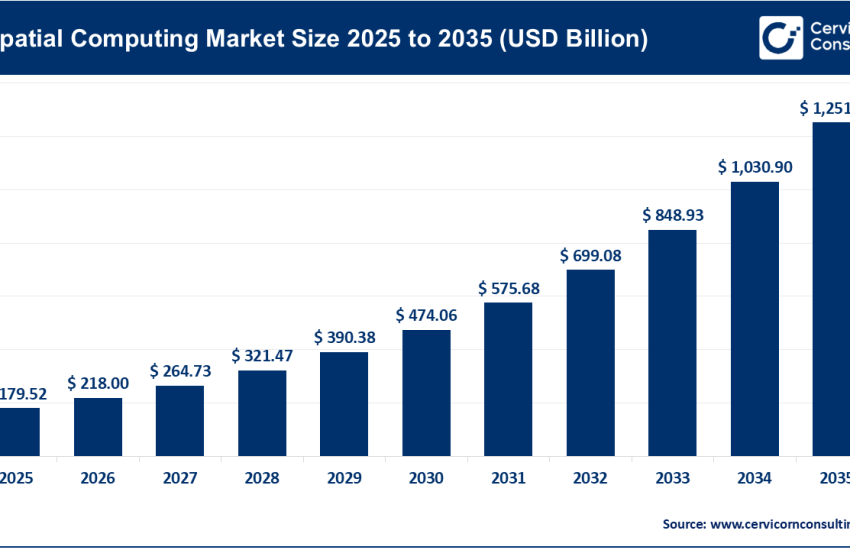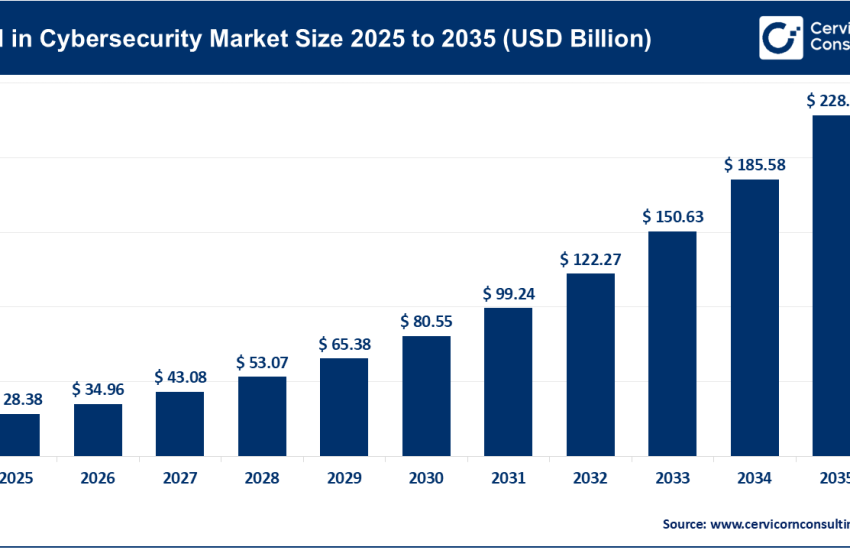Digital Transformation Market to Hit USD 15.82 Trillion by 2034
Table of Contents
ToggleDigital Transformation Market Overview
The global digital transformation market was valued at USD 1.55 trillion in 2024 and is projected to grow to approximately USD 15.82 trillion by 2034, with a CAGR of 26.15% from 2025 to 2034. The market is experiencing rapid growth due to a convergence of technological innovations, evolving consumer expectations, and a pressing need for businesses to streamline operations and enhance competitiveness. Key factors driving this growth include the increasing adoption of cloud computing, AI, IoT, and big data analytics, enabling organizations to automate processes, improve decision-making, and deliver personalized services.
Additionally, the global shift towards remote work and digital services post-pandemic, coupled with the need for enhanced cybersecurity measures, further fuels the market. The proliferation of smart devices and the growing demand for a seamless digital experience across industries, including healthcare, finance, retail, and manufacturing, is reshaping business models and creating vast opportunities for digital transformation. Furthermore, government initiatives and policy support for digitization, along with rising investments in digital infrastructure, are accelerating the growth of this sector, positioning digital transformation as a critical driver of global economic development.
What is the Digital Transformation Market?
The Digital Transformation Market refers to the technological, cultural, and organizational shift businesses undergo to integrate digital technologies into all aspects of operations, fundamentally changing how companies deliver value to their customers and stakeholders. It encompasses the implementation of technologies such as cloud computing, artificial intelligence (AI), big data analytics, machine learning (ML), Internet of Things (IoT), and blockchain to optimize business processes, enhance customer experiences, and create innovative business models. Organizations leverage these technologies to modernize legacy systems, improve agility, automate manual processes, and foster innovation. As companies embrace digital transformation, they become more data-driven, agile, and responsive to evolving market demands.
Why is the Digital Transformation Market Important?
The importance of the Digital Transformation Market cannot be overstated as businesses and organizations increasingly recognize the necessity of digital technologies to remain competitive. In an era where consumer behavior is rapidly shifting towards online platforms and digital interactions, businesses need to modernize their operations to stay relevant. Digital transformation allows companies to enhance operational efficiency, reduce costs, and improve decision-making through real-time data analysis. It also enables organizations to offer better, more personalized customer experiences, which is essential in retaining customer loyalty and fostering growth.
Furthermore, digital transformation facilitates innovation by providing new opportunities for product and service development, and by enabling businesses to quickly adapt to market changes. In a broader sense, the Digital Transformation Market is reshaping entire industries and creating new business ecosystems that focus on agility, scalability, and customer-centricity.
Get a Free Sample: https://www.cervicornconsulting.com/sample/2329
Company, Specialization, and Key Focus Areas of Top Digital Transformation Companies
- Microsoft
- Specialization: Microsoft offers a wide array of digital transformation solutions, primarily focusing on cloud services (Microsoft Azure), artificial intelligence, and productivity tools like Office 365. The company also leads in providing industry-specific solutions through its Dynamics 365 suite for enterprise resource planning (ERP) and customer relationship management (CRM).
- Key Focus Areas: Cloud computing, AI, IoT, business productivity solutions, hybrid cloud, and enterprise solutions.
- 2023 Revenue (approx.): $211.9 billion
- Market Share (approx.): 15% of the global cloud services market
- Global Presence: Microsoft operates globally, with a significant presence in North America, Europe, Asia-Pacific, and Latin America. Its cloud infrastructure is one of the largest worldwide, with data centers located in numerous regions.
- Amazon Web Services (AWS)
- Specialization: AWS is a leader in cloud computing services, offering scalable and cost-effective cloud storage, computing power, and database services. AWS provides a suite of digital transformation solutions, including machine learning, IoT, and data analytics, enabling businesses to leverage the power of the cloud for innovation.
- Key Focus Areas: Cloud computing, machine learning, data analytics, IoT, cybersecurity, and digital infrastructure.
- 2023 Revenue (approx.): $86 billion
- Market Share (approx.): 32% of the global cloud infrastructure market
- Global Presence: AWS has a strong global presence, with data centers across North America, Europe, Asia-Pacific, and Latin America, serving customers in virtually every region of the world.
- Google
- Specialization: Google offers a range of digital transformation services, including cloud computing (Google Cloud), AI, machine learning, big data analytics, and advertising solutions. Google also focuses on productivity tools through Google Workspace and Android, providing businesses with tools to drive digital innovation.
- Key Focus Areas: Cloud services, AI, machine learning, big data analytics, productivity tools, and business automation.
- 2023 Revenue (approx.): $298 billion (total revenue, including digital advertising and cloud services)
- Market Share (approx.): 10% of the global cloud market
- Global Presence: Google has a global presence, with cloud data centers in North America, Europe, and Asia. It serves a broad customer base, ranging from small businesses to large enterprises.
- IBM
- Specialization: IBM has long been at the forefront of digital transformation, offering solutions in cloud computing, AI (through IBM Watson), cybersecurity, and data analytics. IBM’s emphasis is on helping enterprises digitize operations, modernize IT infrastructure, and integrate AI-driven insights.
- Key Focus Areas: Cloud computing, AI, hybrid cloud, data analytics, enterprise solutions, and blockchain.
- 2023 Revenue (approx.): $60.5 billion
- Market Share (approx.): 5% of the global cloud services market
- Global Presence: IBM has a strong international presence, with customers across various industries in North America, Europe, Asia-Pacific, and Latin America.
- SAP
- Specialization: SAP is a leader in enterprise resource planning (ERP) software and business applications. The company specializes in providing cloud-based ERP solutions that help organizations digitize and streamline operations in areas such as finance, supply chain, and human resources.
- Key Focus Areas: Cloud ERP solutions, business analytics, supply chain management, and digital transformation services for enterprises.
- 2023 Revenue (approx.): $35 billion
- Market Share (approx.): 4% of the global cloud services market
- Global Presence: SAP operates worldwide, with a significant presence in Europe, North America, and Asia-Pacific.
Leading Trends and Their Impact on the Digital Transformation Market
Several key trends are shaping the Digital Transformation Market, including:
- AI and Machine Learning Integration: The integration of AI and machine learning in digital transformation initiatives is allowing businesses to automate processes, gain real-time insights from data, and deliver more personalized customer experiences. AI-powered tools, such as chatbots and recommendation engines, are transforming customer service, while machine learning models are enhancing decision-making and predictive analytics.
- Cloud Computing Growth: The shift to cloud computing is one of the most significant trends driving digital transformation. With cloud services offering scalability, flexibility, and cost-efficiency, businesses are increasingly moving their operations to the cloud to improve agility and reduce infrastructure costs. Cloud adoption also facilitates greater collaboration and data sharing across organizational silos.
- Edge Computing: As IoT devices proliferate and data generation increases, edge computing is becoming a key part of the digital transformation landscape. By processing data closer to where it is generated (on the “edge” of the network), organizations can reduce latency, improve efficiency, and enhance the performance of real-time applications.
- Cybersecurity and Data Privacy: As businesses become more reliant on digital technologies, ensuring the security and privacy of customer data is more important than ever. Organizations are increasingly adopting advanced cybersecurity solutions to protect against cyber threats and comply with stringent data privacy regulations.
- 5G Connectivity: The rollout of 5G networks is accelerating digital transformation by enabling faster, more reliable connectivity for IoT devices and mobile applications. 5G enhances the performance of smart technologies, enabling industries such as manufacturing, healthcare, and logistics to innovate and optimize operations.
Successful Examples of Digital Transformation Around the World
- Siemens: The global industrial manufacturing giant has embraced digital transformation through its “Digital Industries” initiative, using IoT, AI, and data analytics to optimize production processes and improve product quality. Siemens has transformed its operations by implementing smart manufacturing solutions and integrating AI-driven predictive maintenance.
- Walmart: Walmart has successfully implemented digital transformation through its e-commerce platform, data analytics, and supply chain innovations. By leveraging AI, big data, and automation, Walmart has optimized inventory management, personalized shopping experiences, and streamlined operations to better compete with online retailers like Amazon.
- DBS Bank: DBS Bank in Singapore has undergone a successful digital transformation, focusing on mobile banking, AI-driven financial services, and customer-centric innovations. By investing in digital platforms and automation, DBS has enhanced its customer service, improved operational efficiency, and expanded its digital product offerings.
Regional Analysis and Government Initiatives
In North America, government policies supporting digital transformation, such as the Digital Government Strategy in the U.S., encourage public sector organizations to adopt digital technologies. In Europe, the EU Digital Strategy aims to make the EU “fit for the digital age,” supporting innovation and improving digital infrastructure.
In Asia-Pacific, countries like China and India are heavily investing in digital transformation initiatives to boost economic growth and modernize industries. The Indian government’s Digital India program and China’s “Made in China 2025” initiative are examples of policies promoting digitization across key sectors.
In Latin America, digital transformation is gaining momentum, with countries like Brazil focusing on improving digital infrastructure and adopting e-government initiatives to modernize public services.
To Get Detailed Overview, Contact Us: https://www.cervicornconsulting.com/contact-us
Read Report: Artificial Intelligence (AI) Chips Market Growth, Trends, and Key Players 2024-2033



